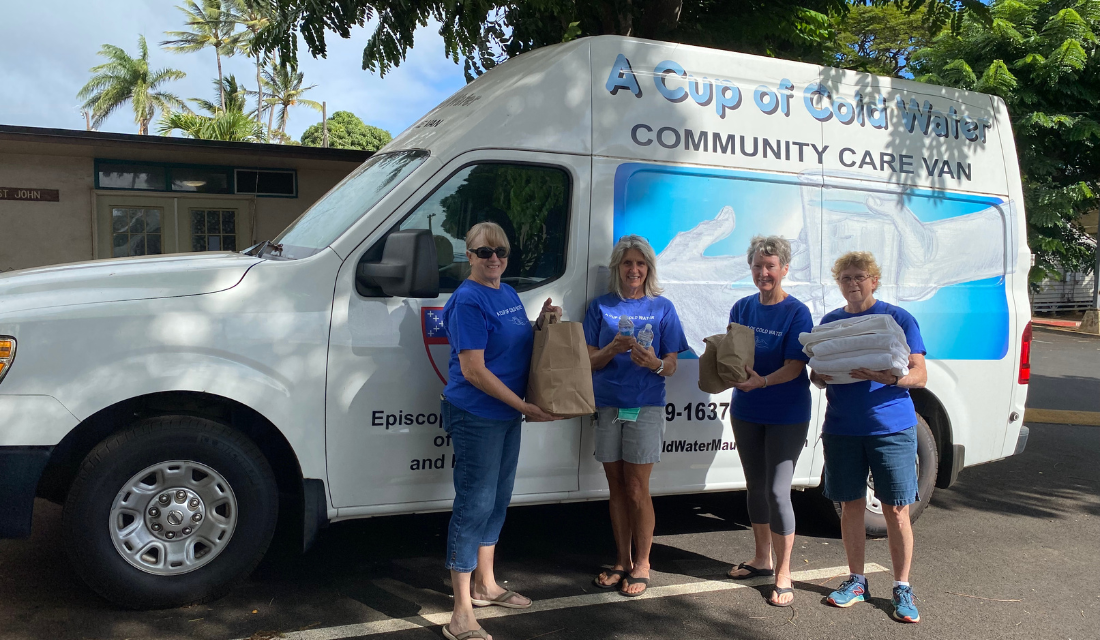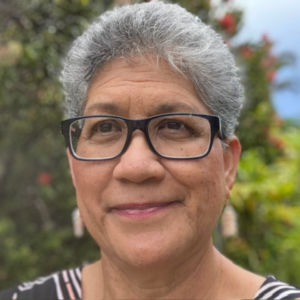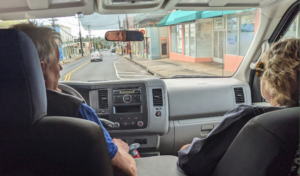In the Meantime: Beginning Long-Term Recovery on Maui

Two retired women are at the forefront of fire recovery efforts on behalf of the Episcopal Diocese of Hawai‘i and Episcopal Relief & Development. Kalani Holokai, a native Hawai’ian and Cathy Paxton Haines who has lived on Maui most of her life are determined and are determined to help people for whom the Lāhainā fire of August 2023 feels like it was yesterday.

“For those I’ve spoken to, they are still dealing with their loss,” Kalani said, “and it’s still raw. They haven’t just lost their homes. Their adult children and grandchildren have also lost their homes. It’s lifetimes of family, work and culture. It’s where they were born, a home they chose and who they are.”
Before retiring, Kalani worked in the hospitality industry and then in public health. Now, she is bringing her love for people, logistics and organization to the community long-term recovery group (LTRG) as a representative of the diocese in partnership with Episcopal Relief & Development. The LTRG is a collective of community and faith-based organizations who joined together to address the needs of Lāhainā fire survivors, some of whom are not eligible for other assistance, are underinsured or have reached the end of their resources.
“I hope we can build on our rich history together,” Kalani said, “because The Episcopal Church is part of it.” She attends community meetings with developers and local leadership to hear about rebuilding plans and how those plans will affect residents. Kalani believes that the Church can be a bridge between the people of Lāhainā and the city planners. “I hope government agencies, especially, include the people and hear their desires for Lāhainā in its plans to rebuild. And I hope the people of Lāhainā will continue to fight for what they want.”
“We provide food, water, supplies and compassion. I don’t know what the answer is to providing permanent shelter to those on the street. But in the meantime, we continue to do what we can.”
– Cathy Paxton Haines
A Cup of Cold Water (ACCW), formed in 2012 by four local Episcopal churches, is an outreach program that provides necessities to people who are living in encampments because they don’t meet the requirements to stay at shelters.
“The people we serve love to see us drive up,” said Cathy, a retiree from the real estate industry and ACCW’s president. “People feel accepted because we don’t judge them,” she explained. “They know us and respect us–they trust us.”

Immediately after the fires destroyed most of Lāhainā and surrounding areas, ACCW volunteers visited encampments with medical staff to conduct check-ups. Since the fires, the number of people served by ACCW has only increased, so three days a week, volunteers continue to visit central encampments across the island.
“We talk to people and listen to their stories and pray with them,” Cathy explained. “We provide food, water, supplies and compassion. I don’t know what the answer is to providing permanent shelter to those on the street,” she reflected. “But in the meantime, we continue to do what we can.”
Episcopal Relief & Development partners with local organizations like the Episcopal Diocese of Hawai‘i to help communities heal, recover and rebuild over time. Together, we remain present long after a crisis, investing in both the short-term and long-term needs of affected communities. You can support long-term recovery by making a donation to the Hawai‘i Emergency Response Fund today.


